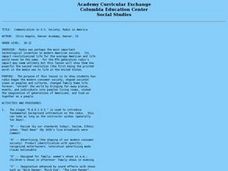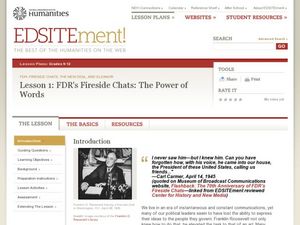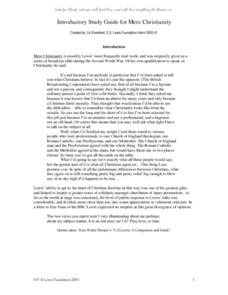Curated OER
Voice of History
Way before the digital age radio was the medium of popular culture. After listening to excerpts from radio programs (easily available on the Internet), participants return to the radio age by creating a two-minute sketch based on a...
Curated OER
Disasters (Natural & Man-made)
Young scholars chose a natural or man-made disaster, such as a tornado or an oil spill, to research using the assigned web sites. They choose a presentation type from a list which includes poetry, radio broadcasts, and safety brochures,...
Curated OER
ESL English Grammar Lesson: The Royal Wedding
Have your ESL learners practice their written and oral English grammar skills, with this highly engaging ESL Lesson. Budding grammarians mingle across the room discovering what they each know about the Royal Wedding between Kate and...
Agriculture in the Classroom
Growing a Nation (1930-1949): From Defeat to Victory, Lesson 2
Using primary source materials including radio broadcasts, films, and interview transcripts, history students gain a better understanding of the Dust Bowl, relief efforts for farmers, and the nation's agricultural past. It includes...
American Battlefield Trust
Civil War Overview: Elementary Lesson Plan
How do you teach the Civil War and all its intricacies within the time limits of an average school day? Using a three-part plan, teachers easily integrate coverage of key Civil War battles into the unit. The lesson includes activities to...
Curated OER
Jumping Off the Bandwagon
Teach your class to be critical consumers by studying persuasion in advertising.
Smithsonian Institution
The Soldier’s Experience—Vietnam versus World War I
The Vietnam War and World War I were two very important—and different—wars. To understand the differences, and similarities, class members watch videos, examine primary source documents, and then create a newscast that examines the...
Curated OER
Webquest: Eradicating Guinea Worm Disease in Ghana
Students examine the impact of Guinea Worm Disease. In this world issues lesson plan, students take on the roles of Peace Corps Volunteers. Students will apply their knowledge of the Guinea worm life cycle to create a plan for...
Curated OER
Becoming familiar with National Public Radio
Students listen to a National Public Radio program. They summarize the program, and write a script from a controversial newspaper article that could be a part of the NPR program they listened to.
Curated OER
Communication In U.S. Society; Radio In America
Young scholars see how radio began the modern consumer society, shaped societal views on peoples and cultures and changed family home life forever. Radio shrank the world by bringing far-away places, events, and individuals into peoples...
Curated OER
Radio
Students explain in their own words how radios work. In this technology instructional activity, students discuss the importance of radio today. They differentiate AM and FM bands.
Curated OER
World War II
Sixth graders read Under the Blood Red Sun (UBRS), V is for Victory (V), and Number the Stars(NS). They examine WWII through the eyes of Japanese, Danish, and American students and complete at least two projects: a radio broadcast and a...
Facing History and Ourselves
Free Press Makes Democracy Work
A unit study of the importance of a free press in a democracy begins with class members listening to a podcast featuring two journalists, one from a United States public radio station and one from Capetown, South Africa. The lesson plan,...
Curated OER
Radio Waves
For this radio waves worksheet, students read about how broadcasting uses radio waves to deliver sound and how radio signals are received. Then students complete 3 short answer questions.
Curated OER
BBC Learning English -working abroad: listening
In this listening worksheet, students will complete a chart identifying which of 5 speakers communicated each of the 18 statements. The corresponding radio broadcast can be found...
Curated OER
FDR's Fireside Chats: The Power of Words
Students examine Franklin D. Roosevelt's Fireside Chats. In this presidential history lesson, students listen to the radio broadcasts of select FDR Fireside Chats. Students analyze the effectiveness of his messages to the public as well...
Facing History and Ourselves
Hands Up, Don't Shoot!
Why is it so difficult to develop a clear understanding of the events surrounding the shooting of Michael Brown by a Ferguson, Missouri, police officer? To answer this question class members listen to a NPR discussion of the findings of...
Curated OER
Electromagnetic Spectrum Worksheet
These six multiple-choice questions ask pupils to evaluate the energy, wavelength, and frequency of particular electromagnetic wavelengths. Further questions then require them to apply their knowledge and convert certain values or give...
Curated OER
A Connecticut Yankee in King Arthur's Court
Students create a presentation in which they retell the events of A Connecticut Yankee in King Arthur's Court. In this A Connecticut Yankee in King Arthur's Court lesson, students are introduced to Mark Twain in a PowerPoint, then...
Curated OER
Comparing the Satellite and Broadcast Radio Landscapes
High schoolers research the development of satellite technology over the last 50 years students explain how the enactment of the Telecommunications Act of 1996 changed the rules for corporate ownership of multiple media outlets.
Rockefeller Archive Center
Understanding Mass Media News
In an age of fake news and photoshopped images, it is vital that 21st century learners development the skills they need to evaluate mass media and assess its validity. A great way to launch such a study is with a carefully crafted lesson...
Curated OER
Edward R. Murrow: This Reporter
What would Edward R. Murrow think of today’s news broadcasts? Learners examine the work of the first public television newscaster and his commitment to researched, accurate reporting. The eight-day study concludes with investigators...
C.S. Lewis Foundation
Study Guide to Mere Christianity
Delve into the arguments central to Christianity as C.S. Lewis in Mere Christianity creates a rational case for his religion. Although slightly preachy in its format, this resource fully outlines, in two different sets, the essential...
Curated OER
The War of the Worlds
Students discover the concept of media based on literature. In this War of the Worlds lesson, students read the novel The War of the Worlds by H.G. Wells and listen to the 1938 radio broadcast adaptation by Orson Welles. Students then...

























